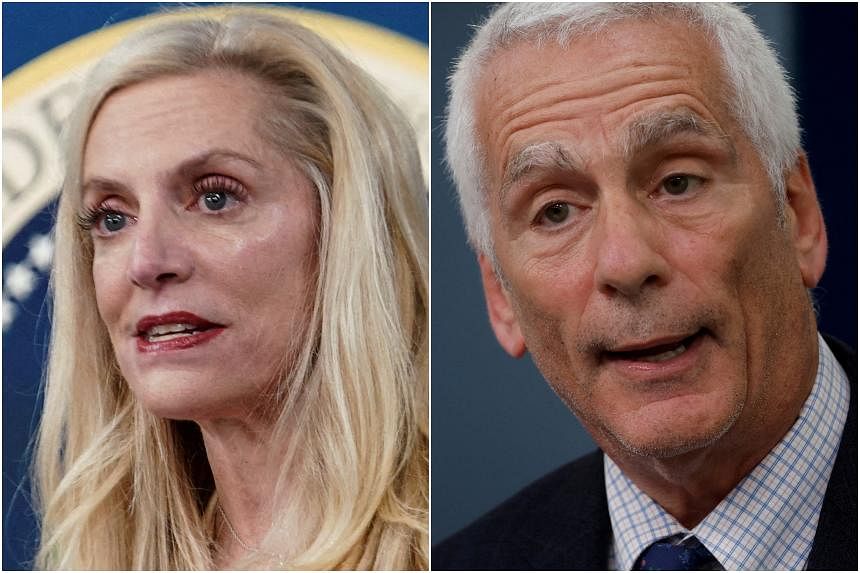WASHINGTON - US President Joe Biden on Tuesday picked United States Federal Reserve vice-chair Lael Brainard and White House economist Jared Bernstein as his top economic advisers, part of a fresh push by the Democratic President to convince sceptical Americans his economic policies are working.
The decision, announced after markets closed, gives Mr Biden a pair of trusted Washington insiders to steer economic policy as the risk of recession fades but inflation lingers.
Big fights also loom with the Republican-controlled House of Representatives over raising the debt ceiling.
Mr Biden named Ms Brainard the director of the National Economic Council (NEC) to replace Mr Brian Deese, who announced his departure in February.
The President also said he would nominate Mr Bernstein to replace outgoing Council of Economic Advisers (CEA) chair Cecilia Rouse, the first black American in that post, who will return to Princeton University. Mr Bernstein already serves on the CEA.
“Lael and Jared will help bring a seriousness of purpose to the task of building a strong, inclusive and more resilient economy for the future,” Mr Biden said in a statement.
He underscored the new team’s focus on achieving a soft landing amid the Fed’s continued raising of interest rates to rein in inflation, building an inclusive economy, and helping US businesses thrive and become more competitive.
The shake-up comes as the White House tries to tackle what officials view as a frustrating disconnect between relatively strong economic data and weak public sentiment.
Mr Biden’s approval ratings dropped 6 percentage points to 36 per cent in a new Reuters/Ipsos poll, despite unemployment at 53-year lows and improving consumer sentiment.
Mr Biden also handed a new job title, adviser for strategic economic communications, to deputy NEC director Bharat Ramamurti, former adviser to Senator Elizabeth Warren and vocal critic of oil and gas companies’ windfall profits.
Current CEA member Heather Boushey was named chief economist in Mr Biden’s new “Invest in America” Cabinet, and Labour Department chief economist Joelle Gamble one of Ms Brainard’s deputies.
The Fed has not named a replacement for Ms Brainard, who supported recent rate increases to tame inflation while noting the impact corporate profit margins have on rising prices.
Armed with a new team of economic advisers, Mr Biden is also expected to take aim at Republican plans to cut US spending.
At issue is the Republicans’ refusal to raise the statutory US$31.4 trillion (S$42 trillion) debt limit unless Mr Biden agrees to spending cuts, while the White House has said such measures will be discussed only after the debt ceiling is lifted.
Mr Biden will seek to flip the script and point the finger at a Republican agenda that he says will amount to “a massive giveaway to the super-rich, big corporations and Big Pharma”, the White House said.
Since taking control of the House in January, Republicans have passed measures to reverse or pare back Biden-backed laws, including the Inflation Reduction Act that includes green tax credits and reforms aimed at lowering prescription drug prices. Republicans argue that federal spending is too high and will fuel inflation while raising the US debt level.
Treasury Secretary Janet Yellen said on Jan 19 that the US has reached its current US$31.4 trillion borrowing cap, but can keep paying its bills until June by shuffling money between accounts.
Investors have warned edging closer to that deadline could have dire market repercussions.
Mr Bernstein told a think-tank audience in Washington last week that Republican efforts to “weaponise” the debt limit was “especially reckless” with the economy slowing and inflation still coming down.
Both he and Ms Brainard have argued labour market disparities are curbing US growth potential; neither have in-depth experience negotiating with hostile lawmakers.
Mr Bernstein last week conceded the White House’s early description of inflation as “transitory” had missed the mark.
He said the administration was closely watching energy prices, citing tight refinery capacity and China’s reopening as possible pressure points. REUTERS

